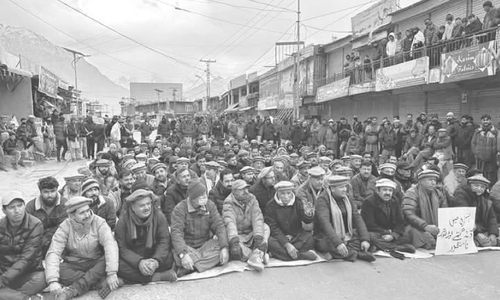GENEVA, April 30: Global food shortages and higher prices are more likely to cause malnutrition than outright famine, at least in the near term, the coordinator of a new United Nations task force said on Wednesday.
John Holmes, who also serves as the UN’s top humanitarian aid official, said it was too early to estimate how much extra money would be needed to confront crises stemming from increasingly unaffordable food staples in poor countries.
“People, particularly those on the lowest incomes, will be eating less and less well,” he told a news conference in Geneva, where much of the UN’s emergency aid operations are managed.
“I don’t think that in the very short term we are talking about starvation and famine,” Holmes said.
Protests, strikes and riots have erupted in developing countries around the world in the wake of dramatic rises in the prices of wheat, rice, corn, oils and other essential food items that have made it difficult for poor people to make ends meet.
“It is not possible as yet to put a figure on what the immediate humanitarian needs may be for the forthcoming year,” Holmes said. “We need to put those funding needs together.”
Vulnerable Groups
The task force will work to draft a strategy on both short- and long-term responses to food supply strains, which economists have linked to factors, including high fuel and fertiliser costs, the use of crops for biofuels, and commodity market speculation.
Holmes called on donor governments to provide extra money in response to the crisis that has touched countries from Peru to Indonesia, Afghanistan and Senegal, and squeezed the World Food Programme’s efforts to feed millions of people.
Young children, who can face life-long health problems from malnourishment, as well as pregnant and nursing mothers, are among the most vulnerable groups in developing countries, where food crises also stand to trigger political unrest.
Knee-jerk Response Opposed
Holmes warned against a hasty response to the growing use of biofuels. “I think we should avoid a knee-jerk response,” he said.
“Biofuels were developed in response to a very serious problem, which is the effects of climate change, the need to mitigate the effects of climate change and reduce emissions,” Holmes said.
“They weren’t invented just for fun.” However, “clearly this is something that needs a new look in present circumstances,” he added, calling for a “careful, sophisticated and differentiated” approach.
The UN independent expert on the right to food, Jean Ziegler, has called biofuels a “crime against humanity” and urged a moratorium on their production.
But Holmes’ views were echoed by Lennart Baage, president of the International Fund for Agricultural Development (IFAD), one of the 27 bodies present at this week’s meeting that set up the task force and a key provider of support to developing countries.
“It is important not to go to extremes,” Baage told AFP.
“We should not say all of a sudden that all biofuels are bad,” he said, noting that many biofuels are based on residues rather than crops and do not compete with food.
In recent months, rising food costs have sparked violent protests in Cameroon, Egypt, Ethiopia, Haiti, Indonesia, Ivory Coast, Madagascar, Mauritania, the Philippines and other countries.
In Pakistan and Thailand, army troops have been deployed to avoid the seizure of food from fields and warehouses, while price increases fuelled a general strike in Burkina Faso.
In response, many governments have adopted protectionist measures such as export bans for staple crops like grain and rice.
Baage said this “rushed” response “may be understandable, but it means there will be even less food on the world market.” Instead, he said it is crucial that both developed and developing countries work together with international organisations to invest in more productive, resilient and sustainable agriculture.
“It’s not rocket science or miracles, we know what farmers need,” he said.
IFAD is playing its part in this by supporting farmers in developing countries such as Haiti with their “input” costs such as fuel and fertilisers.
Prices of these commodities have also soared in recent months leaving many poor farmers unable to take advantage of the booming food market. “There is actually a risk that farmers will be planting less rather than more,” Baage warned.—Agencies












































Dear visitor, the comments section is undergoing an overhaul and will return soon.